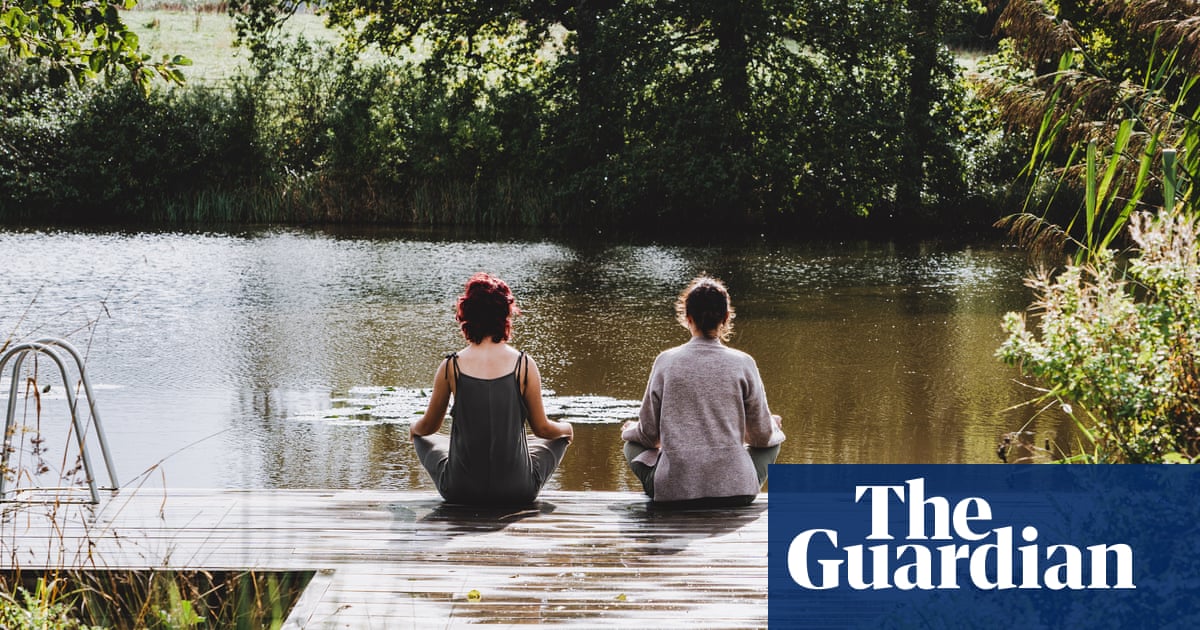
The honk of the geese as they take off from the lake is comically loud, reeds quiver and the reflection of the clouds on the water is momentarily fractured. A butterfly flits by, landing on my boot. We’re on a guided walk at 42 Acres, a regenerative farm, nature reserve and retreat centre near Frome in Somerset – and the whole place feels vibrantly alive.
Our guide Tasha Stevens-Vallecillo, a font of knowledge on plants and wild food and one of the visionaries shaping the retreat, stops to point out yarrow, ribwort plantain and a giant white reishi mushroom as we walk. “There’s medicine everywhere on the land. You just need to know where to look,” she says.
The farm’s name is, in fact, a misnomer. What started 10 years ago with the original 42 acres and farmhouse (where private retreats are still held), now stretches to 173 acres (70 hectares) with new accommodation options. Run on 100% renewable energy by sibling owners and keen environmentalists Lara and Seth Tabatznik, it’s an inspiring place to wander.
There are ancient woodlands, an outdoor sauna and the seven-acre lake for wild swimming or taking out a rowing boat (the best way to see resident beavers at dawn or dusk). Fresh produce comes from the no-dig garden, “edi-mental” walled garden (where everything is both ornamental and edible) and full-to-bursting polytunnels. There’s a micro-mushroom farm, a bee garden with wild and locally raised bees, and thousands of nut and medicinal trees (from super-power sea buckthorn to rosehip).
We’re staying in the newly restored 13th-century hermitage. A former monks’ retreat, it’s sumptuous yet simple, full of natural light and open fires. My room is calming, with muted colours, a huge bed, sheepskin rugs and stained-glass bathroom windows. Cottages, barn conversions and a houseboat offer alternative accommodation. Everything is conducive to relaxing.
“The aim is to provide a refuge for people to slow down, reconnect to nature and learn about how we can live in harmony with the land,” says Tasha.
I’m here for a Rewild retreat, one of three new themed Wild Weekends. While all three offer the chance to disconnect from technology and spend time on the land, Rewild focuses on nature restoration. The Renourish retreat concentrates on the soil-to-gut food philosophy, foraging and cooking; Restore offers more pampering, including yoga and massage. There are also self-guided retreats, where guests book a room and dip in to activities, from gardening to meditation, as they choose.
Experts in different fields join the retreats too. On our stay, maverick rewilder Derek Gow, author of Bringing Back the Beaver, shows us where beavers, reintroduced here in 2016, are changing the landscape, helping increase wetlands and biodiversity. That evening, he joins us by the fire to share tales from his new book about the wolf. (For those up for an impromptu visit, there is still availability on this weekend’s retreat, 26-28 April, hosted by Lulu Urquhart, winner of the RHS Chelsea best in show in 2022 for her garden A Rewilding Britain Landscape.)
Food and feasting are very much central to any stay. Everything is organic, nutrient-rich and mostly from the land (or within 42 miles), with wild and foraged foods included in all meals. (The onsite Tiny Wild kitchen creates delights such as tomato and rosehip ketchup, and sells products to take away too.) Every morsel, from the wild garlic and cheddar muffins to the medicinal mushroom broth is delicious. Wild Weekends also feature a Food, Fire and Forest experience, with food cooked over an open fire and shared in a clearing under the fairylight-festooned forest canopy. Sadly heavy rain puts paid to that idea on our visit.
It doesn’t stop us getting hands dirty and seeing land regeneration in action, however. After breakfast on our second morning we pull on wellies and head out with Martin White, who looks after the land. We’re helping create hedgerow and plant nearly 300 trees, a native mix of hawthorn, field maple, dogwood and hazel. Martin says: “We’re letting the land lead, but managing it in a way that supports people and biodiversity. We’ve seen an increase in wildlife, from bats to woodpeckers and bees, and we grow and gather a huge amount of food.” After the success of Knepp in West Sussex, there’s a plan to reintroduce storks here too, and to bring in wild cats, which will be housed in giant pens as a step towards eventual reintroduction.
Beside weekend retreats, 42 Acres holds dozens of day events year-round, including workshops on wild medicine and “energy exchanges”, where visitors can learn about permaculture and help out on the farm.
For somewhere that has so much going on, it’s amazing how peaceful and slow-paced everything feels – 42 Acres is really all about living the good life, and deeply nourishing on every level.
The visit was provided by 42 Acres, whose Wild Weekends cost from £350pp (two sharing), including all meals and experiences